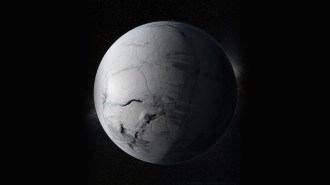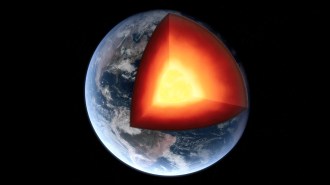Earth/Environment
Licorice may be a natural alternative to antibiotics on hog farms, plus more in this week’s news
Summer downer for Norway cod
As climate changes, the Skagerrak coast of southeastern Norway may turn unfriendly to the commercially important Atlantic cod fishery, warns a Norwegian-U.S. research collaboration. The researchers say warmer springs may rev up growth among cod not even a year old, but warmer summers appear to stunt growth and should be increasingly likely to wipe out spring benefits. This push-crush dynamic, described January 18 in the Proceedings of the National Academy of Sciences, contrasts with earlier results suggesting that warm summers boost growth. The new analysis was made possible by an unusual series of cod surveys performed annually from 1919 through 2009. —Susan Milius
Smoke on the water
Fallout from burning coal may have choked the life out of 90 percent of marine species some 250 million years ago, Canadian researchers argue in the Jan. 23 Nature Geoscience. Huge quantities of carbon-rich char fell on the high Arctic prior to the Permian mass extinction of marine organisms, the scientists found. Based on the carbon’s geology and chemistry, the researchers propose that it traces back to the natural combustion of Siberian coal and organic-rich sediments. Being “remarkably similar” to modern coal fly ash, the char would have been toxic to aquatic life and ultimately would have dispersed globally, the researchers say. —Janet Raloff
Pigging out on licorice
Most U.S. livestock farms administer low doses of antibiotics to ward off infections that might limit their animals’ growth. Japanese scientists report preliminary data online December 22 in the Animal Science Journal that indicate certain natural products — such as licorice and seaweed — enhance the immune systems of pigs. It’s possible, they conclude, that including such products in animal feed could limit the overuse of antibiotics in agriculture, a practice that has been charged with fostering the development of resistant microbes that can later infect people. —Janet Raloff
A weaker carbon pump
Oceans are a key player in the planet’s carbon cycle, but researchers may have found that one way the oceans store carbon is less significant than thought. A team led by researchers from the National Oceanography Centre in Southampton, England, report in an upcoming issue of Geophysical Research Letters on new measurements of the “biological carbon pump,” which sequesters small carbon-rich particles that sink from the ocean’s surface to its depths. Using a version of the radioactive element thorium, which sticks to particles and thus traces their movement, the researchers found that much less carbon was sinking than other, indirect, studies have suggested. —Alexandra Witze
Greenland’s big melt
Greenland’s massive ice sheet may be melting in a more complex fashion than scientists had realized. It’s known that meltwater atop the ice percolates down and lubricates glaciers’ advance, thus hastening ice loss into the ocean. But a team led by scientists at the University of Leeds in England suggests in the Jan. 27 Nature that this is not the whole story. Their studies of six glaciers in western Greenland show that drainage at the glaciers’ bottoms becomes more efficient as summer advances, helping offset melt-induced ice acceleration. The work could improve predictions of how much sea level rise to expect as Greenland thaws. —Alexandra Witze







